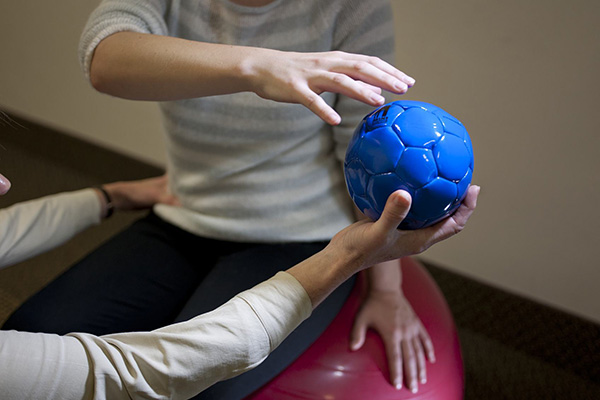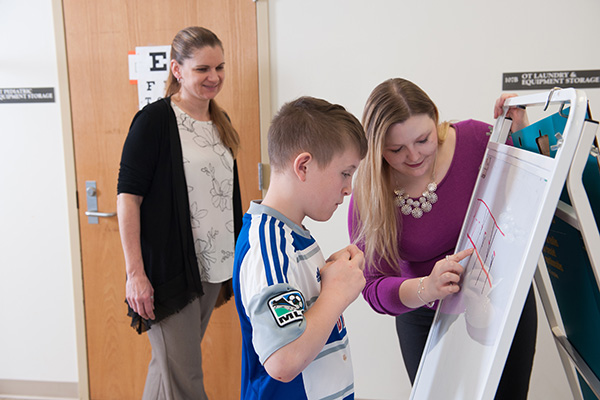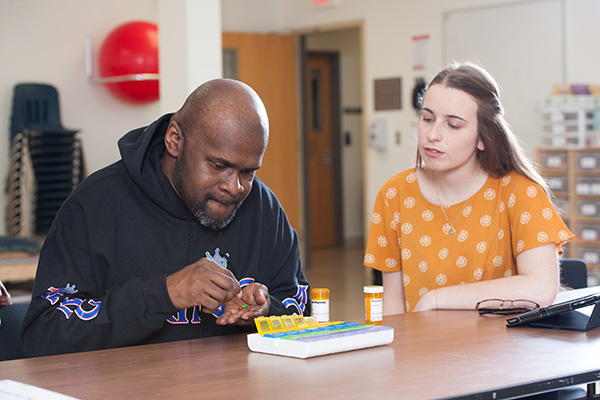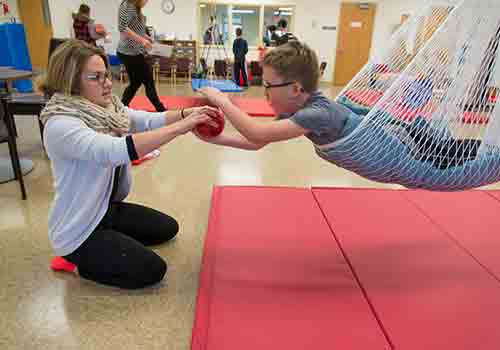Occupational Therapy
Bachelor of Science / Master of Science
Help people engage in what makes life meaningful to them.
Occupations are meaningful activities that "occupy" our daily lives, like grocery shopping, sleeping, going to school, and spending time with loved ones!
Occupational therapists help others to achieve or regain the ability to engage in occupations that are important to them, overcoming physical, cognitive, perceptual and/or psychosocial challenges. OTs can help people develop or resume activities like completing self-care, learning in school, engaging in social relationships and community activities, or participating in job responsibilities. OTs work in many different private, non-profit, and public settings including schools, hospitals, skilled nursing facilities, people's homes, rehabilitation centers, and community health agencies.

Highlights
Begin OT classes and be involved with clients in clinics from the first semester
Five community-based fieldwork experiences
B.S.-M.S. direct entry
Consistently 100% pass rates on the certification exam and 100% graduation rates



Career Paths
- Occupational therapist in elementary and high schools
- Special needs settings
- Hospitals
- Clinics
- Home care
- Medical equipment firm
- OT schools and research laboratories
- Long-term care
- Private practice
Is a doctorate required?
No. The American Occupational Therapy Association (AOTA), which oversees occupational therapy education, determined with the Accreditation Council of Occupational Therapy Education (ACOTE) that people can enter the field as an occupational therapist with either a master's degree or a doctoral degree. If AOTA ever decides to mandate doctoral degrees for entry, all OTs with their master's degree will be grandfathered in and will not require additional education.
Internships and Field Experiences
- Albany Medical Center
- BronxCare Hospital
- Guthrie Specialty Care Clinic, Fort Drum, NY
- Healthcare Resort of Colorado Springs (CO)
- Jewish Senior Life
- Just Kids Early Childhood Learning Center (Middle Island, NY)
- Mary Cariola Children's Center
- Penn State Health Rehabilitation Hospital (PA)
- Radiant Child Therapy (NV)
- Rochester Psychiatric Center
- Rush-Henrietta School District
- Sarasota Memorial Health Care Center (FL)
- University of Rochester Medical Center
100%
OT students consistently have 100% graduation rates and high pass rates on the National Board for Certification in Occupational Therapy (NBCOT) certification exam.
17.9%
OT jobs are expected to grow 17.9% (adding 23,700 jobs nationwide) through 2028, much faster than average, according to The Bureau of Labor Statistics.
Top 20
U.S. News & World Report recently ranked occupational therapists among the top 20 health care jobs and #28 overall among The 100 Best Jobs.
Program Details
- The curriculum offers you a wide range of interprofessional academic and clinical experiences, including an on-campus OT clinic, clinical outreach activities, and fieldwork opportunities.
- All occupational therapy majors take a gross anatomy course that includes dissection of a cadaver.
- Five rigorous practice courses in the senior year provide opportunities for hands-on clinical experience evaluating, planning and implementing and documenting interventions. Unlike other colleges, you'll do ongoing work with the same clients for 7-10 weeks.
- You will have the opportunity to engage in collaborative research with faculty and OT clinicians.
- You can prepare to work with young children and their families in early intervention and preschool by choosing the Developing Child and Families minor.
- You have the option to get specialized preparation in working with school-age children with autism through Nazareth's Interdisciplinary Specialty Program in Autism (I-SPAN) specialization.
- You have the option to include an early-intervention interprofessional concentration (track): Rochester Scholars for Early Intervention helps you develop specialty knowledge and skills to be a strong advocate for young children and their families.
- Most courses are offered in person, with interaction with professors and peers. The courses offered online (OTR 516, OTR 518, OTR 501, OTR 551 and a summer online option for OTR 101 and 102) also include in-person sessions for a portion of the course. You need access to a device with an internet connection; Nazareth students can use computers in Nazareth's library and computer labs.
Admissions standards for occupational therapy »
Become a Changemaker
- You will learn to take action and help people engage in what makes life meaningful to them.
- You will learn to persevere by addressing change through skill development and environmental modifications. Example: All OT students complete a certification program focused on learning how to assess the physical and social inclusion of all people at local recreation facilities. You then complete a community assessment and work with Rochester Accessible Adventures to make meaningful suggestions for change.
- You learn how to take a holistic approach with clients — such as working with faculty and OTs at Rochester Psychiatric Center to create and implement group activities to address psychosocial challenges.
- You will learn and have experiences that will help you engage in interprofessional practice in various health care settings, such as through medical case simulation with other health and human service students.
- You will learn to advocate, especially for underserved populations, including through meetings with New York state congressional members along with faculty to promote legislative changes that support health and wellness for underserved and marginalized populations.

Alumni Spotlight
“The strengths of the OT program include building close relationships with OT professors over five years and gaining more hands-on experience than is required by the profession. We do three week-long, and two 3-month fieldwork placements, which allow us to participate in providing OT in schools, long-term care facilities, hospitals, home care, and rehab centers. Each OT 'practice' course is connected to a clinical experience working with clients on campus and off-site. As a student OT, I’ve had so many opportunities to build a network.”
— Morgan Monahan ‘17G, shown in the campus clinic helping a child build muscle tone, improve posture, encourage attention, and develop his skills using both hands.